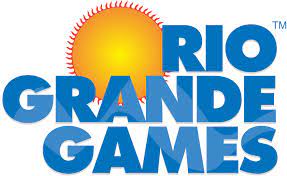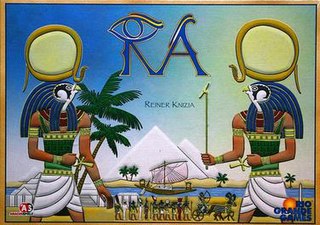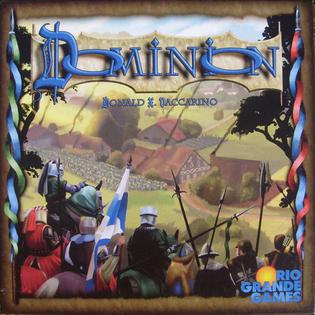
Elfenland is a German-style board game designed by Alan R. Moon and published by Amigo Spiele in German and Rio Grande Games in English in 1998. Elfenland won the Spiel des Jahres award in 1998.

A Eurogame, also called a German-style board game, German game, or Euro-style game, is a class of tabletop games that generally has indirect player interaction and abstract physical components. Eurogames are sometimes contrasted with American-style board games, which generally involve more luck, conflict, and drama. They are usually less abstract than chess or Go, but more abstract than wargames. Likewise, they generally require more thought and planning than party games such as Pictionary or Trivial Pursuit.

Rio Grande Games is a board game publisher based in Placitas, New Mexico. The company primarily imports and localizes foreign language German-style board games.

El Grande is a German-style board game for 2-5 players, designed by Wolfgang Kramer and Richard Ulrich, and published in 1995 by Hans im Glück in German, by Rio Grande Games in English, and by 999 Games in Dutch. The game board represents renaissance-era Spain where the nobility fight for control of the nine regions. El Grande was praised for its area-control mechanism, and was awarded the Spiel des Jahres prize and the Deutscher Spiele Preis in 1996. Following its release, several expansions and an alternative version were published.

Power Grid is the English-language version of the second edition of the multiplayer German-style board game Funkenschlag, designed by Friedemann Friese and first released in 2004. Power Grid was released by Rio Grande Games.

Ra is a board game for two to five players designed by Reiner Knizia and themed around Ra, the sun-god of Heliopolis in ancient Egyptian culture. It is one of three auction games designed by Knizia, the others being Medici and Modern Art.

Queen Games is a German publisher of tabletop games, based in Troisdorf and founded in 1992 by head Rajive Gupta, which specialises primarily in German-style, family-level games but has also published smaller numbers of both simpler, children's games and more complex, gamers' games.

Niagara is a German-style board game designed by Thomas Liesching and published in 2004 by Zoch Verlag and Rio Grande Games. In Niagara, which is set in the Niagara Falls, players collect, transport, and steal gems. Upon its release, the game won several awards, including the 2005 Spiel des Jahres.
Ted Alspach is an American game designer and CEO of Bezier Games, Inc. He is best known as the designer of Castles of Mad King Ludwig, Suburbia, One Night Ultimate Werewolf, Ultimate Werewolf, and Werewords. Alspach is also one of the world's leading experts on Adobe Illustrator. He served as its Group Product Manager for several releases and published 18 books on it over the course of 20 years.

Luiz Antônio Venker de Menezes, known as Mano Menezes, is a Brazilian professional football coach and former player. He is the current head coach of Internacional.
To Court the King is a dice-based board game for 2–5 players designed by Tom Lehmann. It was published in German by Amigo Spiele as Um Krone und Kragen in 2006, and in English as To Court the King by Rio Grande Games. The basic mechanics of rolling and re-rolling dice have drawn comparisons to the game of Yahtzee.

Zooloretto is a board game designed by Michael Schacht, published in 2007 by Abacus Spiele and in English by Rio Grande Games. The premise of the game is that each player is the owner of a zoo, and must collect animals in order to attract visitors to their zoo. Having full, or nearly full, animal enclosures scores more points. However, if a player has too many animals such that they must be stored in their "barn", this causes them to lose points. Vending stalls also offer a means for players to score points with enclosures that are not full.

Dominion is a card game created by Donald X. Vaccarino and published by Rio Grande Games. It was the first deck-building game, and inspired a genre of games building on its central mechanic. Each player begins with a small deck of cards, which they improve by purchasing cards from a common supply that varies from game to game. Cards can help the player's deck function, impede their opponents, or provide victory points. As of December 2022, fifteen expansions to the original Dominion have been released.
Michael Schacht is a German game designer, graphician and owner of the small publishing company Spiele aus Timbuktu.

Marcel-André Casasola Merkle is a game designer.

Lookout Games is a German board and card game publisher. The company published, among other games, the board game Agricola, which was honored with the Complex Game award by the German Game of the Year jury in 2008.

Mississippi Queen is a German board game published by Goldsieber Spiele in 1997 that simulates a paddlewheel race down the Mississippi River in 1871. The game was also published in English by Rio Grande Games, and won several awards including the Spiel des Jahres.
Going Cardboard: A Board Game Documentary is a 2012 documentary about the American adoption of German-style board games, and includes coverage of the 2009 board game event Spiel in Essen, Germany, as well as interviews with many prominent game designers. The film was written, directed and produced by Lorien Green, who was introduced to board gaming by her husband. It was financed through the crowd funding service Kickstarter.

Manila is a German-style board game designed by Franz-Benno Delonge and published in 2005 by Zoch Verlag and Rio Grande Games. It involves auctioning/bidding, betting/wagering, commodity speculation, dice rolling, and worker placement. It is set in colonial Manila.















